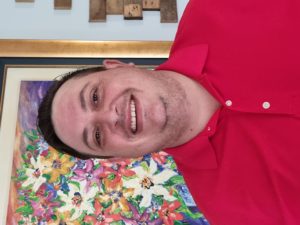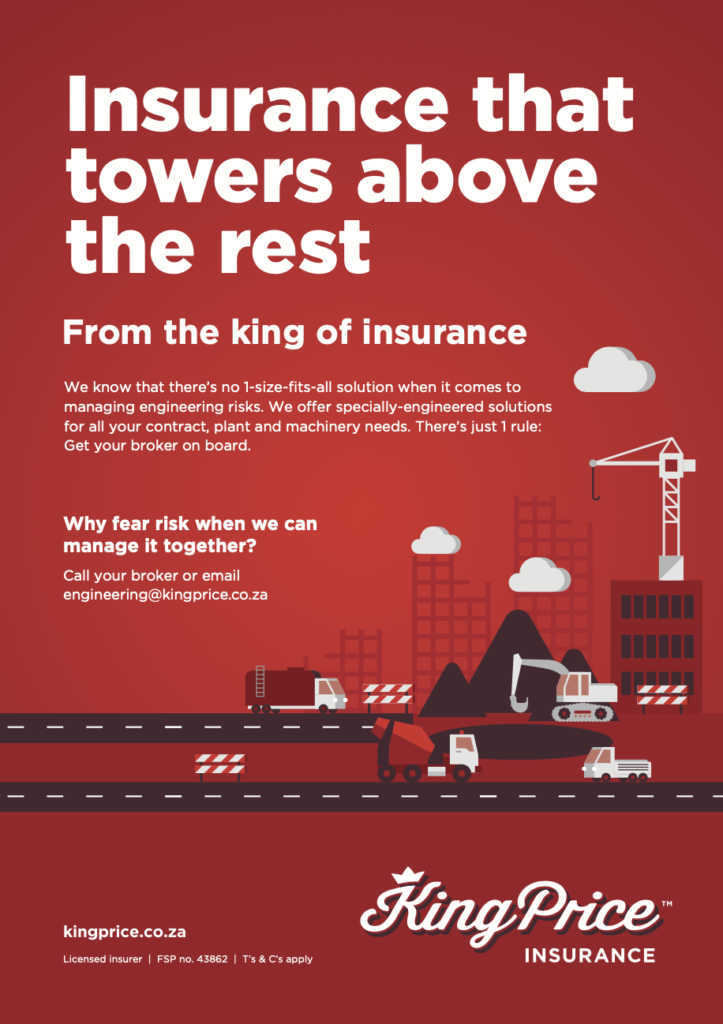Andre Alberts: Earl of Engineering: King Price
Tony: The construction industry has been, and still is, under quite a bit of pressure on the back of COVID-19 and the suppressed economy. However, there’ve been a few green shoots in that environment. Can you give us an overview of what 2022 was like from King Price’s perspective?

Andre: So far, 2022 has been a lot better than 2020 and 2021, for obvious reasons. We, like many other sectors, have experienced the same thing with construction itself in terms of green shoots. Currently, the highlight or emphasis is on clean energy projects.
We’ve seen a lot of solar electricity generation plants being constructed which goes hand in hand with the current electricity crisis we’re facing. We’re also seeing an uptake in general construction.
Government infrastructure spending is mostly maintenance-related, but there’s the opportunity for electricity feeding into the grid, and that’s currently quite a boom.
Tony: Many projects are driven by repairs, maintenance and things that must be done quickly to solve issues or problems. The other side of construction and engineering infrastructure is the proactive type of infrastructure, based on planning and strategy.
How does it look on that front?
Andre: The only thing that springs to mind is that we’re seeing solar panels on almost every building and surface that you can think of. There’s a lot happening proactively in the solar electricity space; and the fulfilment of current and future energy needs. We see this development as an opportunity in the engineering insurance market. The rest is, like you say, maintenance.
Tony: Did you guys have to acquire new skills regarding solar, especially small-scale solar?
Andre: Yes, it’s definitely a learning curve. With the speed that development in that sector is taking place and with technology constantly evolving, we’ve acquired new skills and learning. There are a few product providers out there, but there’s already been movement on the product. What I mean by that is, a product gets developed for a specific need and then suddenly that need changes. To give you a typical example, the first solar plant insurance product that was out there, had a section related to the probability of the solar delivering the required electricity output that was committed to. However, it was subsequently found that these solar plants deliver exactly what they guarantee because of the massive amount of sunshine in Africa.
So, the risk is negligible, the probability of a claim is extremely small, and that portion of the policy is no longer even a requirement for any investor.
Tony: How do you feel about 2023?
Andre: It’s up and away. I’m positive about the future. There are construction projects in the pipeline and we’ve seen a couple of quotes on larger projects coming through. There’s an upward curve and there’s no doubt in my mind that solar plant construction projects will add to South Africa’s electricity generation capacity and assist with economic growth.
I don’t foresee all the country’s electricity problems being solved in the near future, but I believe the severe electricity shortage and strain on Eskom’s infrastructure will eventually be rectified. There’s a big drive and motivation to find alternative energy solutions, especially in the solar energy space.
Tony: As an industry, we must follow innovation in construction and engineering. How are we doing there? Are you optimistic about the flexibility of insurance products to accommodate innovation?
Andre: It’s a tough one because we, as an insurer, are guided and backed by reinsurers as well. Product development and the direction in which that product will go must be done in collaboration with our reinsurers which can sometimes be a lengthy process. The upside to this is having access to our reinsurers and being able to tell them what the need in the market is and then develop a suitable product.
We’re fortunate in that we’ve got access to international knowledge and expertise through the two largest reinsurers in the world which extends our capacity to take on risk. We can make quick decisions and try our best to be flexible to accommodate our client’s needs and risks. See-through glass solar panels are a notable example of how fast technology is developing. Just imagine if all the windows of a building can generate power without being monstrosities on a roof. This will be aesthetically pleasing and have a myriad of practical applications.
We used to see only two types of solar plants: Either at ground level or installed on roofs. We’re now seeing floating solar farms on the water – the sea or even dams in some European countries. This comes with associated new risks. You’ve got electricity on water which can be a challenge. It’s unchartered territory and technology to most insurers and we’re adapting our products as we gain more experience in this field.
The latest trend in South Africa is mobile solar generation where solar panels are mounted on huge trolleys. These trolleys can be moved by heavy machinery to a location where there’s a need for solar energy or where the generation of solar energy is optimal. The transportation and movement of these solar plants add new risks to the asset and our products need to cater for this exposure. This keeps us on our toes and forces us to innovate our offering in conjunction with the renewable energy industry’s needs.
Tony: It’s good to see that when things go slow in certain parts of the industry, in other parts of the industry new ways of insuring people pop up.
Andre: The industry is changing at a fast pace, and we need to keep up to address our client’s needs and risk exposures.
Tony: In closing, that brings up opportunities for brokers again. They should look at these changes, talk to their insurers and find out where the opportunities are.
Andre: I agree. I can’t highlight the importance of a broker’s role enough, especially in commercial entities. Holding hands, having that personal relationship with someone, and having them at your disposal when needed. It’s invaluable. Brokers add a lot of value, especially when providing financial advice and guidance to their clients that have unique and specialist exposures, such as engineering insurance.


